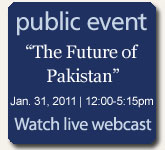Afghan President Hamid Karzai inaugurated a new parliament yesterday ending a political deadlock. USIP’s Director of Afghanistan and Pakistan, Andrew Wilder, assess the meaning of this move.
 January 27, 2011
January 27, 2011
Afghan President Hamid Karzai inaugurated a new parliament yesterday ending a political deadlock. USIP’s Director of Afghanistan and Pakistan, Andrew Wilder, assess the meaning of this move.
- How important is the inauguration of a new parliament in Afghanistan?
- Does it impact the war on the ground where U.S. and international troops are fighting?
How important is the inauguration of a new parliament in Afghanistan?
The inauguration on January 26th of Afghanistan’s new parliament is a very positive and important event. While it will not resolve all the outstanding political problems resulting from the deeply flawed September 2010 parliamentary elections, it averted what would have been one of the most serious constitutional crises since the ratification of the new constitution in January 2004. The fact that the decisions of the constitutionally mandated Independent Election Commission and the Electoral Complaints Commission trumped the unconstitutional efforts of a special tribunal appointed directly by President Karzai, which sought to overturn some of the election results and delay the parliament’s inauguration, helps set an important precedent. At a time of great political instability and uncertainty in Afghanistan, the inauguration of the parliament sends a vital message that adhering to the constitution and following the rule of law matters.
Afghanistan’s first parliament was full of unsavory individuals and its performance left a lot to be desired, and this second parliament is also likely to often disappoint and fall short of expectations. Nevertheless, it should be supported and strengthened by the international community as it is an essential democratic institution, and has the potential to serve as an important check on the powerful executive branch.
Does it impact the war on the ground where U.S. and international troops are fighting?
The inauguration of the new Afghan parliament is unlikely to have an immediate impact on combat operations against the Taliban-led insurgency. The Taliban, through a spokesperson, have already announced that “The opening or not opening of this assembly is not important to us.” However, the parliament could and should have an important role to play in efforts to promote a politically negotiated end to the conflict, which would of course greatly facilitate the drawdown of international troops from Afghanistan.
An unfortunate aspect of the inauguration in terms of the war effort was President Karzai using his opening speech as an opportunity to blame “foreign interference” for many of the election-related problems. This is just the latest of a series of statements from the president blaming the international community for many of Afghanistan’s problems. While there are certainly grounds for criticism, Karzai’s increasingly vocal public criticisms of the international community’s actions in Afghanistan risk fueling a perception that the war against the Taliban-led insurgency is not the Afghan government’s war, but a war being fought by the U.S. and its NATO allies on Afghan soil.
 There is another potentially negative result of President Karzai’s mishandling of the post-election political situation. Perceptions of who holds the balance of power are extremely important in Afghanistan. The fact that on this occasion President Karzai picked a political battle and lost weakens him. While on the one hand having a stronger parliament to serve as a check on the strong powers of the executive branch is a positive development, a politically weakened and diminished President Karzai could become an even more difficult partner precisely at a time when Afghanistan needs strong political leadership to lead a process that would hopefully culminate in a negotiated settlement that ends the conflict in Afghanistan.
There is another potentially negative result of President Karzai’s mishandling of the post-election political situation. Perceptions of who holds the balance of power are extremely important in Afghanistan. The fact that on this occasion President Karzai picked a political battle and lost weakens him. While on the one hand having a stronger parliament to serve as a check on the strong powers of the executive branch is a positive development, a politically weakened and diminished President Karzai could become an even more difficult partner precisely at a time when Afghanistan needs strong political leadership to lead a process that would hopefully culminate in a negotiated settlement that ends the conflict in Afghanistan.